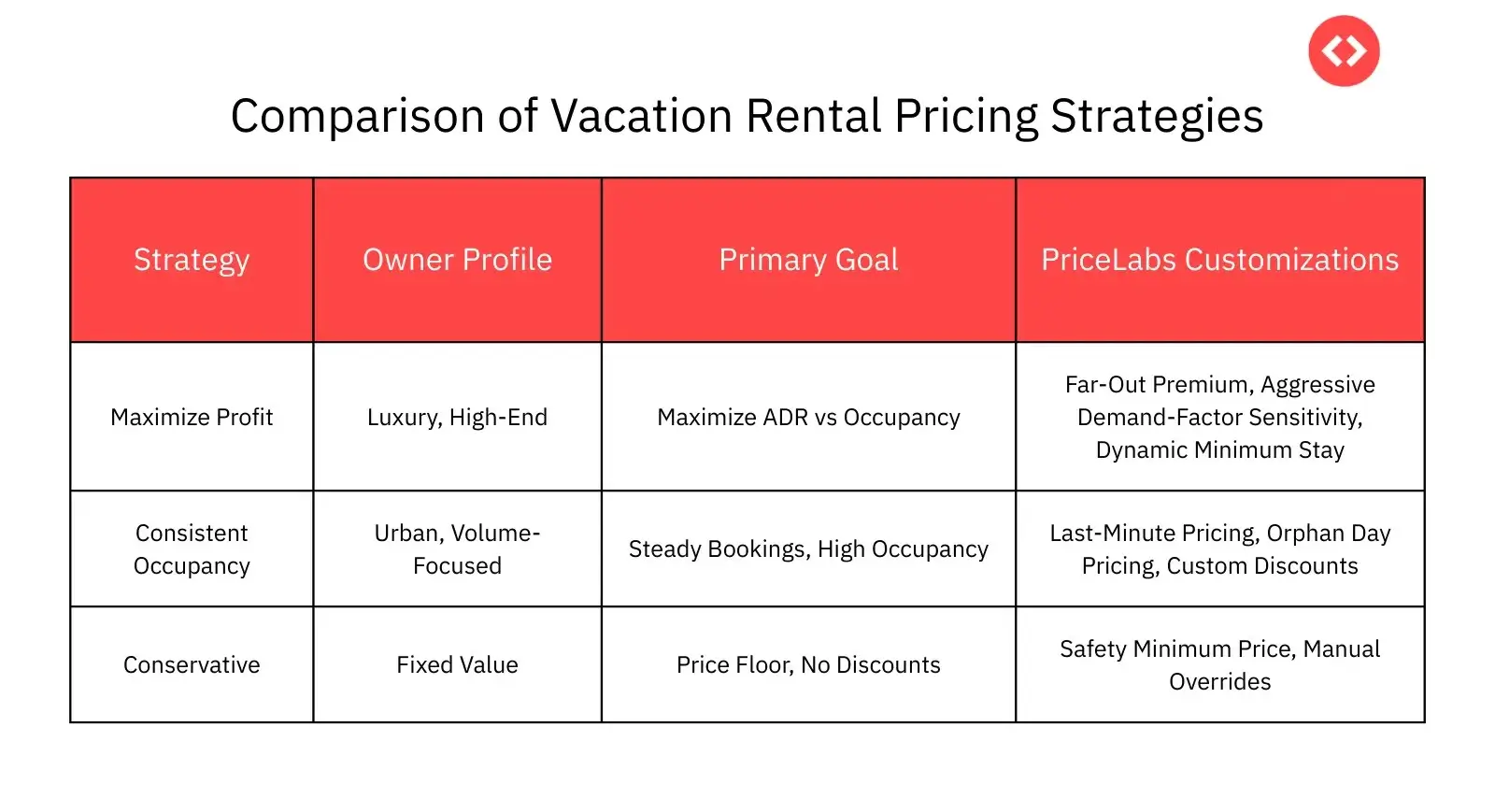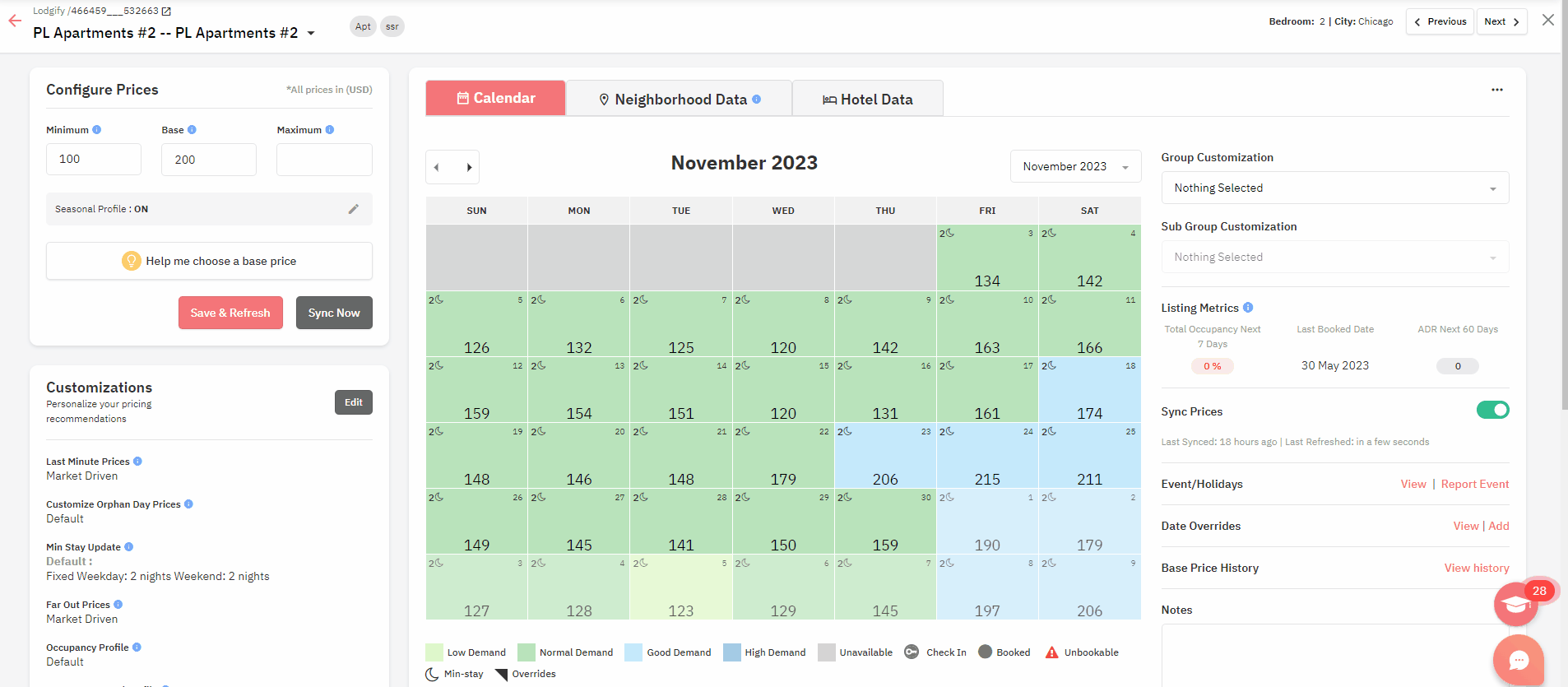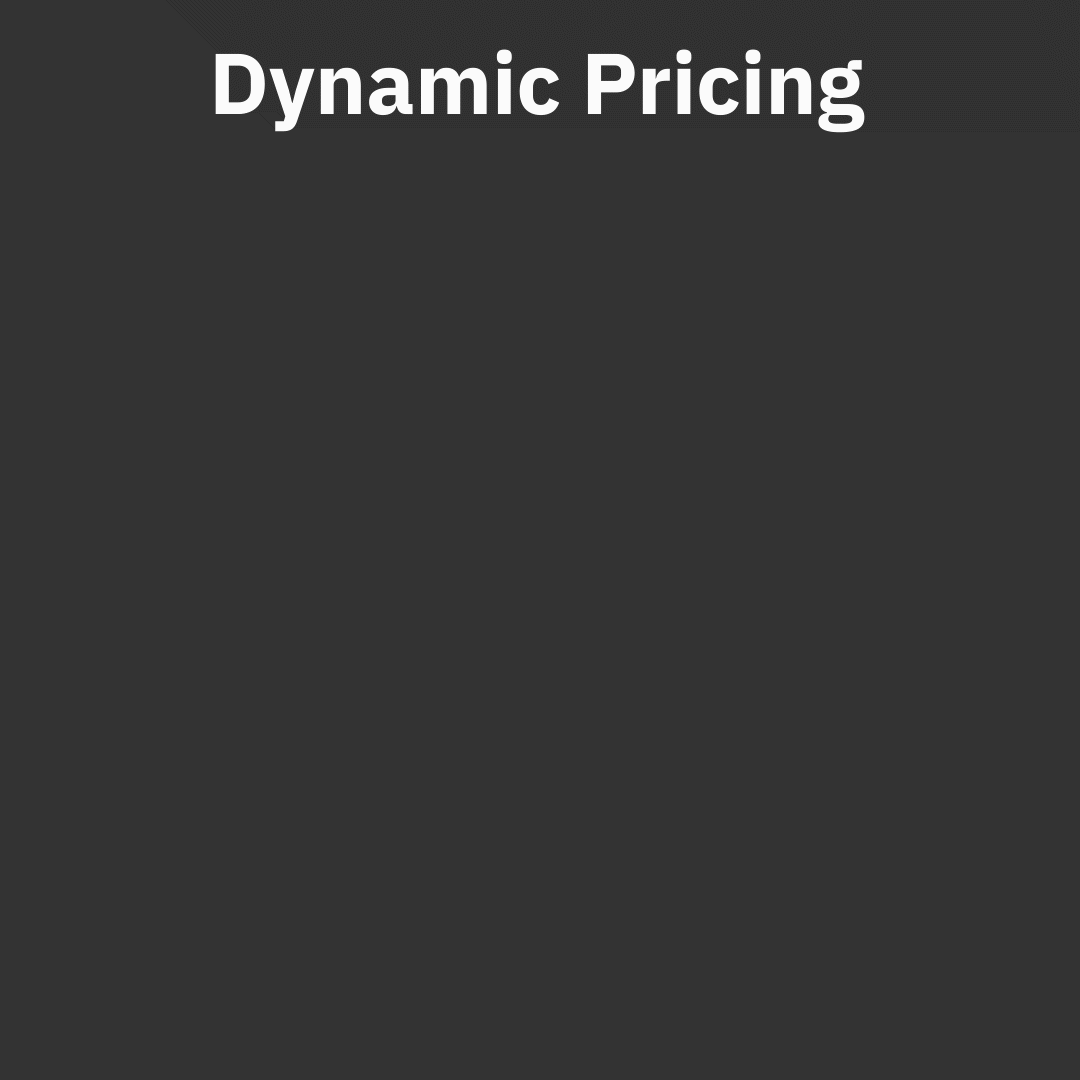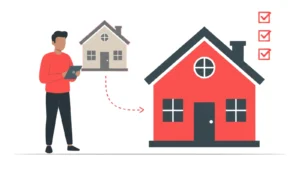Table of Contents
Updated : Sep 22, 2025
A vacation rental pricing strategy is the tailored approach property managers use to balance owner goals, Average Daily Rate (ADR), and occupancy rates using dynamic pricing software. As a vacation rental property manager, your primary goal is to maximize revenue and satisfaction for every owner in your portfolio. However, in a dynamic market, a one-size-fits-all approach to vacation rental pricing strategy is a recipe for underperformance and owner frustration. The key to success is to move beyond generic strategy and implement a customized vacation rental pricing plan tailored to each property and its unique owner.
This guide provides a structured and comprehensive approach to tailoring your pricing strategies to meet diverse owner goals, leveraging a combination of dynamic pricing tools and your own market expertise, as Lumina Suites successfully scaled its portfolio to over 100 listings.
Step 1: Understanding Owner Goals & Segmenting Your Rental Portfolio
As a professional property manager, you know that successful vacation rental revenue management hinges on more than just a single tool. Before you even touch a dynamic pricing tool, the most critical step is to have a clear conversation with your property owners. What are their priorities? A luxury beachfront villa owner might prioritize a high Average Daily Rate (ADR), while an urban condo owner may be more focused on a consistent Airbnb occupancy rate.
- Understanding Owner Goals: This proactive approach not only fosters trust but also provides a clear framework for making data-driven decisions using vacation rental analytics.
- Segmenting Your Portfolio: Don’t manage all your properties as a single entity. Create groups based on property type, location, amenities, and owner goals. This makes it easy to apply and adjust pricing rules for property managers for a specific segment of your portfolio at once.
Revolutionize Your Revenue with PriceLabs
Ready to move beyond generic pricing? PriceLabs Dynamic Pricing Customizations help you tailor your revenue management stratgies for different owner preferences. Stop leaving money on the table and start building trust with data-driven results.
Start Your Free TrialStep 2: Customizing Dynamic Pricing for Different Owner Personas
Tailor your pricing approach to align with the goals you identified during your initial consultation. Here are three pricing strategies for Different Vacation Rental Owners, along with the corresponding strategies to match them, utilizing specialized PriceLabs dynamic pricing software.


For the “Maximize Profit” Owner: Implementing a High-ADR Vacation Rental Pricing Strategy
This owner wants to capture every possible dollar, even if it means a few nights with no bookings. They are less concerned with consistent occupancy and more focused on the highest possible ADR. This is a common strategy for owners of high-end or luxury properties. This owner values stability above all else. They are uncomfortable with long periods of vacancy and prefer a steady flow of bookings, even if the nightly rate is lower. As Alex, a host from southeast England, discovered, relying on a fixed price meant overcharging in the winter and losing money during the high-demand summer months.
- Far-Out Premium: Apply a premium for bookings made far in advance (e.g., 6-12 months in advance). This helps secure early revenue and sets a high-value tone.
- Aggressive Demand-Factor Sensitivity: Set a profile that significantly raises prices when market occupancy is high. This capitalizes on strong demand, allowing the property to capture top-tier rates.
- Dynamic Minimum Stay Restrictions: Utilize a longer minimum stay during peak seasons and high-demand periods to increase the average booking value. This ensures high-quality bookings for owners.
For the “Consistent Occupancy” Owner: Focusing on Volume and Stability
This owner values stability above all else. They are uncomfortable with long periods of vacancy and prefer a steady flow of bookings, even if the nightly rate is lower. A great example of this is a property in an urban market with a high volume of short-term bookings.
- Aggressive Last-Minute Pricing: Use a strategy that automatically discounts rates for unbooked nights as the date approaches. This ensures the property remains competitive for last-minute travelers and minimizes vacancy, which is crucial for this owner’s peace of mind.
- Orphan Day Pricing: Create a rule to target and discount orphan gaps between bookings specifically. This fills otherwise unrentable nights that can frustrate owners who see empty slots on their calendar.
- Custom Discounts for Low Seasons: Custom Seasonal Profiles is an important PriceLabs customization to set pricing and minimum stay rules for different seasons. Set up a flat percentage discount for specific slow periods, such as weekdays in January, to stimulate bookings when demand is naturally low. This is a crucial component of a comprehensive vacation rental pricing guide.
For the “I Don’t Want to Discount” Owner: Adopt the Conservative Pricing Approach
Some owners have a fixed idea of their property’s value and are fundamentally opposed to dropping the price, even to secure a booking.
- Safety Minimum Price: For these owners, a key customization feature is a safety minimum price. This allows you to set a price floor that the algorithm will not drop below, providing peace of mind to the owner.
- Manual Overrides for Peak Dates: For special high-demand dates, you can set date-specific overrides to override the recommended price to set a premium flat rate. This allows the owner to “test the market” without the algorithm lowering it.


Step 3: Applying Dynamic Pricing Tools as a Revenue Manager
While airbnb pricing tools are essential, they are not a replacement for your expertise. The most successful property managers combine automation with a hands-on, strategic approach. By doing so, Stay in London was able to save over 6 hours a week and confidently react to event-based demand spikes for their properties in Central London


1. The Pricing Hierarchy:
- Account Level: Set your company’s broad, default pricing rules. This provides a baseline for your entire portfolio.
- Group Level: For your segmented property groups, apply specific customizations that override the account-level rules. This is where you implement strategies tailored to different owner personas.
- Listing Level: At the most granular level, you can apply unique rules for a single property to meet an individual owner’s specific, unique requests.
2. The Power of Context and Manual Overrides
- Identify Special Events: Utilize your local knowledge to establish minimum prices and a targeted vacation rental pricing strategy for high-demand dates that a standard algorithm may overlook. Consider extending your celebrations beyond major holidays to include local festivals, sporting events, or concerts.
- Spot Check and Adjust: Make it a habit to regularly review your pricing calendars. Look for underperforming properties and analyze the market pacing. If a property is consistently underperforming, it may be an opportunity to apply a temporary discount or adjust your length-of-stay minimums to secure a booking.
While Airbnb dynamic pricing tools are essential, they are not a replacement for your expertise. By embracing this structured and customized vacation rental pricing approach, you move beyond being a simple property manager to a strategic revenue partner. This not only drives better performance for every property but also builds deep trust and credibility, solidifying your reputation as a top-tier professional in the vacation rental industry.
Frequently Asked Questions
What is the difference between a generic pricing tool and a specialized Airbnb pricing tool?
A specialized Airbnb pricing tool utilizes complex data to adjust your rates for maximum revenue automatically. A generic tool relies on basic rules, which can result in missed opportunities.
How does “smart pricing” differ from manually setting prices?
Smart pricing means your nightly rate adjusts automatically in real-time based on demand, competition, and season. This saves property managers hours of manual adjustments.
How can I use vacation rental analytics to make better decisions?
Vacation rental analytics provides deep insights into your market, showing trends in demand and competitor pricing. By analyzing this data, you can make informed decisions that align with an owner’s specific goals.
How do I find the best pricing tools for my short-term rentals?
The best pricing tools offer a high degree of customization to meet diverse owner goals. When you’re searching for the best Airbnb software, prioritize platforms that give you granular control over pricing, occupancy, and minimum stay rules.
Do these strategies work for platforms other than Airbnb, like Vrbo?
Yes, these pricing strategies are universal. PriceLabs functions as an Airbnb and Vrbo aggregator, allowing you to apply your revenue management strategies across multiple platforms and utilize Vrbo’s dynamic pricing to optimize listings on that site.
What is the role of a revenue management company?
A revenue management company is a strategic partner that uses data and market expertise to optimize a property’s income. As a property manager using a tool like PriceLabs, you are essentially acting as a revenue management company for your owners.







